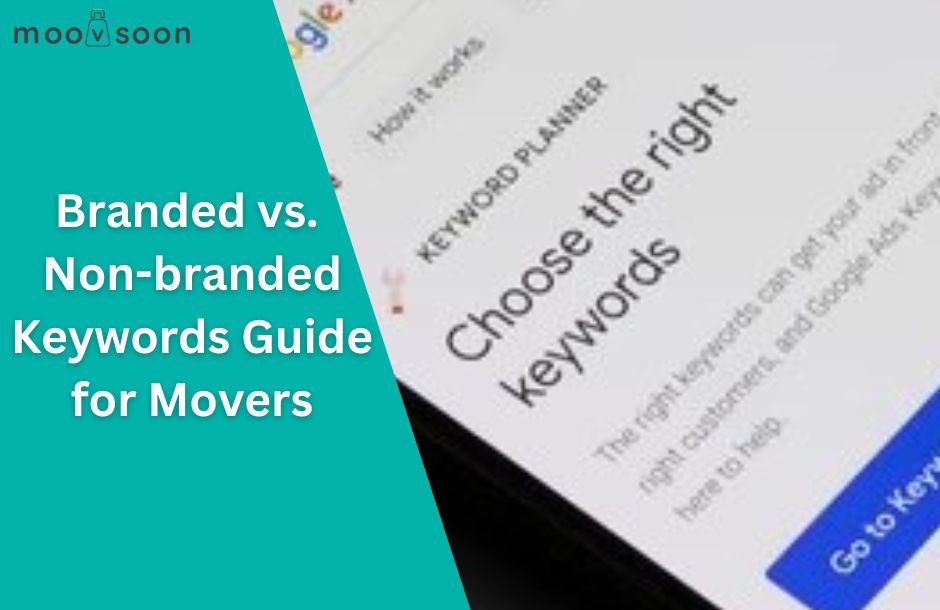
Branded vs. Non-Branded Keywords in SEO – Guide for Movers
In today’s fast-paced digital world, understanding the difference between branded and non-branded keywords has become crucial for effective search engine optimization (SEO). Why is this distinction so important? Grasping these concepts can significantly enhance your digital marketing strategy, leading to better visibility and engagement with your target audience.
Branded keywords are terms that include your company name or its variations. These keywords indicate a clear intent from users who are specifically searching for your brand. They often signify brand loyalty and recognition, which can translate into higher conversion rates. For example, if someone searches for “Nike shoes,” it demonstrates a direct interest in the Nike brand, potentially leading to a purchase.
Conversely, non-branded keywords do not mention your brand directly. Instead, they focus on broader concepts such as products, services, or industry-related terms. These keywords allow you to reach a wider audience, capturing the interest of potential customers who may not yet be familiar with your brand. For instance, a search for “running shoes” can attract individuals exploring various options, expanding your reach beyond loyal customers.
Analyzing both branded and non-branded keywords is essential for understanding market trends. By evaluating how these keywords perform, businesses can gain valuable insights into consumer behavior and preferences. This information can guide content creation and marketing strategies, helping brands stay competitive in their industries.

How do branded keywords impact a company’s online presence?
Branded keywords are integral to a company’s online presence as they directly relate to the company’s name, products, or services. These keywords enhance brand recognition and authority, driving targeted traffic from users already familiar with the brand. When users search for branded terms, it typically indicates a higher intent to engage or purchase, as they are often past the awareness stage in the buyer’s journey.
They positively impact search engine rankings by improving click-through rates (CTR), as these keywords often rank higher due to the brand’s established relevance. Additionally, branded keywords can strengthen customer loyalty by consistently showcasing the brand’s unique value, leading to repeat visits and conversions.
Companies can also use branded keywords strategically in paid advertising, ensuring competitors cannot easily capture their traffic. Ultimately, leveraging branded keywords effectively can bolster a company’s market position and foster a strong digital identity.
Why do branded keywords typically face less competition?
Branded keywords generally face less competition because they are unique to a specific company or product, reducing the likelihood of many businesses bidding on them. Companies often own these terms as they reflect their brand identity, leading to lower competition and cost in search advertising.
As a result, branded keywords can enhance a company’s online presence by driving more relevant traffic, boosting brand recognition, and improving conversion rates. This targeted approach allows businesses to connect with consumers who are already familiar with or interested in their products, increasing the efficiency of their marketing strategies.
How do branded keywords lead to higher conversion rates?
Branded keywords greatly enhance a company’s online presence by driving higher conversion rates. These keywords represent the unique identifiers of a brand, making them highly relevant and targeted. When users search for branded terms, they often have a strong purchasing intent, as they are already familiar with the brand and its offerings. This familiarity builds trust, increasing the likelihood of a purchase.
Moreover, branded keywords typically result in lower competition and cost-per-click in paid search campaigns, allowing companies to optimize their marketing budget. The focus on brand-specific terms also improves search engine visibility and reinforces brand recognition, further boosting conversion rates.
What role do non-branded keywords play in attracting new customers?
Non-branded keywords play a significant role in attracting new customers by broadening the reach of a business’s online presence. Unlike branded keywords, which focus on terms directly associated with a specific brand, non-branded keywords target more generic terms related to the products, services, or industry. This allows businesses to capture potential customers who are in the early stages of the purchasing journey and are not yet committed to a particular brand.
By using non-branded keywords, companies can tap into a wider audience searching for solutions or information related to their offerings. For instance, a company selling organic skincare products might use non-branded keywords like “natural moisturizers” or “eco-friendly skincare” to attract customers interested in these categories but not yet familiar with their brand. This strategy increases visibility in search results, drives organic traffic, and can lead to higher conversion rates as these visitors explore the brand’s offerings.
Furthermore, non-branded keywords help improve a website’s SEO by diversifying the types of queries it ranks for, potentially leading to higher overall page authority and search engine rankings.
How can non-branded keywords increase overall business visibility?
Non-branded keywords are essential for enhancing business visibility by targeting a broader audience. These keywords focus on products or services without mentioning the brand name, attracting users unfamiliar with the brand. By incorporating non-branded keywords, businesses can reach potential customers in the early stages of their buying journey.
For example, a search for “leather shoes” might lead users to discover various brands, including yours. This strategy increases exposure and potential customer base, as users searching for general terms can become aware of and interested in your offerings.
Why do non-branded keywords often have higher search volumes?
Non-branded keywords often have higher search volumes because they include generic terms that users frequently search when exploring new products or services. These keywords play a vital role in attracting new customers by capturing a broader audience.
For instance, someone searching “running shoes” is likely exploring options without a specific brand in mind, making it an opportunity for various brands to appear in search results. This broadens reach, as these searches are less about brand loyalty and more about discovering solutions that fit the user’s needs.
Additionally, non-branded keywords help businesses tap into users who are in the initial stages of the buying journey, increasing the likelihood of conversion.
How does competition differ between branded and non-branded keywords?
Branded keywords typically face less competition than non-branded keywords. This is because branded keywords are specific to a particular brand or product, making them unique and often used by customers with high purchase intent. For example, “Nike running shoes” directly target Nike’s products, attracting a more niche audience.
Non-branded keywords, such as “running shoes,” are broader and attract more competition. These keywords are sought after by multiple brands and retailers aiming to capture a wider audience, hence increasing the difficulty of ranking for them. They cater to users in the initial stages of the buying process, who are exploring various options.
Why might competitors bid on your branded keywords?
Competitors might bid on your branded keywords to capture traffic that is searching specifically for your brand. When users search for a brand name, they often have high purchase intent, making this traffic valuable. By targeting branded keywords, competitors aim to divert potential customers to their own offerings, increasing their market share.
In contrast, non-branded keywords typically have broader competition. They focus on general product categories, attracting a wider audience with varied intent, but potentially lower conversion rates. This strategic approach allows competitors to compete directly with your brand for high-value traffic.
How does higher competition for non-branded keywords affect SEO strategy?
Higher competition for non-branded keywords considerably impacts SEO strategy. Non-branded keywords typically have broader appeal, attracting a larger audience but also facing more competition from various businesses. This competition makes ranking for non-branded keywords more challenging, necessitating a robust SEO strategy focusing on high-quality content, effective keyword research, and optimization techniques.
Branded keywords, on the other hand, usually have less competition since they are specific to a company or product. This allows businesses to rank more easily, as users searching with branded keywords are likely seeking specific information related to that brand. Consequently, SEO strategies for non-branded keywords require more effort in content creation and link-building to stand out in a crowded market.
What are the cost implications of targeting branded versus non-branded keywords?
Targeting branded versus non-branded keywords in SEO involves different cost implications due to their unique characteristics. Branded keywords, which include a company’s name or specific product, typically have lower competition and CPC (Cost Per Click) since they attract a more focused audience. This can lead to higher conversion rates due to pre-existing brand awareness.
Conversely, non-branded keywords, which are more generic, face higher competition, often resulting in increased CPC. These keywords can attract a broader audience, potentially increasing overall traffic but may require more substantial investment to achieve visibility. Consequently, businesses must weigh the cost benefits of branded keywords’ efficiency against non-branded keywords’ reach, aligning their strategy with marketing goals and budget constraints.
Why do branded keywords often result in a lower cost-per-click (CPC)?
Branded keywords often result in a lower cost-per-click (CPC) due to less competition compared to non-branded keywords. Businesses targeting branded terms typically bid on their own brand names or variations, which leads to a niche market with fewer bidding rivals. This specificity allows for reduced bids and lower CPCs.
Additionally, branded keywords generally have higher conversion rates as users searching for these terms already have intent or familiarity with the brand. This efficiency in conversion further justifies lower CPCs, making branded keywords a cost-effective strategy.
How can the higher CPC of non-branded keywords impact advertising budgets?
Targeting non-branded keywords typically involves higher costs per click (CPC) compared to branded keywords. This is because non-branded keywords are more competitive and generic, attracting a broader audience. As a result, advertising budgets may need to increase considerably to maintain visibility and reach.
Businesses might face higher overall costs, impacting budget allocation across other marketing initiatives. However, non-branded keywords can also bring in new customers who are not already familiar with the brand, potentially increasing market reach and sales. Balancing the investment in both types of keywords is essential for optimizing advertising strategies effectively.
How should businesses balance the use of branded and non-branded keywords?
Balancing branded and non-branded keywords in SEO is vital for businesses to optimize visibility and attract the right audience. Branded keywords, which include the company’s name or specific product names, help target existing customers or those familiar with the brand. These keywords often have higher conversion rates because they attract users already interested in the brand. However, their search volume is typically lower.
Non-branded keywords, on the other hand, are fundamental for reaching new audiences. These keywords target broader search terms related to the business’s industry or offerings. They usually have higher search volumes, which can greatly increase traffic to a website. However, they might attract less qualified leads compared to branded keywords.
For an effective SEO strategy, businesses should analyze their audience and goals. A balanced approach involves using branded keywords to nurture existing customer relationships and non-branded keywords to expand market reach and drive new customer acquisition. Regularly reviewing keyword performance and adjusting strategies can guarantee that the business captures both qualified leads and new prospects effectively.
Why is it important to monitor and protect your branded keywords?
Monitoring and protecting branded keywords is vital for businesses to maintain their online reputation and customer loyalty. Branded keywords are terms that include a company’s name or specific products, guaranteeing that search results reflect the brand’s identity. By safeguarding these terms, businesses can prevent competitors from capitalizing on their brand’s reputation, which can lead to customer confusion or loss.
Balancing branded and non-branded keywords is fundamental for an all-encompassing SEO strategy. While branded keywords enhance brand recognition and protect reputation, non-branded keywords attract new customers searching for general products or services. This dual approach guarantees businesses capture both brand-loyal and potential new customers, maximizing visibility and growth opportunities.
How can targeting non-branded keywords expand your customer base?
Targeting non-branded keywords can markedly expand your customer base by attracting users who are unaware of your brand. These keywords focus on product categories or solutions rather than specific brand names, allowing businesses to reach a broader audience looking for generic solutions.
By optimizing for non-branded keywords, businesses can tap into new market segments, capturing potential customers at the research or consideration stage of the buying process. Balancing the use of branded and non-branded keywords involves analyzing search intent and aligning content strategies to address both loyal customers and new prospects.
Conclusion
Evaluating the impact of branded and non-branded keywords in SEO highlights their unique benefits and strategic roles. Branded keywords often yield higher conversion rates as they attract users already familiar with your business, boosting engagement and customer loyalty. However, their reach is generally confined to your existing customer base, limiting potential growth.
In contrast, non-branded keywords are essential for expanding visibility and attracting new customers. They target individuals searching for services within your industry who may not yet know your brand. This approach is vital for broadening market reach and diversifying traffic sources, ultimately promoting business growth.
To optimize your SEO efforts, balancing branded and non-branded keywords is crucial. Regularly analyze performance data to identify which keywords drive engagement and conversions. This data-driven strategy allows for continuous adjustments to enhance your SEO approach and improve results effectively.



